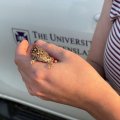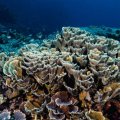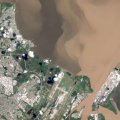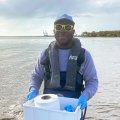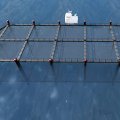The Global Change Institute small grant recipients for 2010 have been announced and illustrate the breadth and depth of research activities at The University of Queensland.
Funded proposals demonstrate the changing way researchers are being encouraged to collaborate to approach problems with a broad multi-disciplinary perspective – a core facet of how the GCI does business.
This grant scheme was open to the UQ research community and proposals were required to respond to the global change drivers of climate change, population change and technological innovation, through one or more of the seven key GCI focal areas of Business Sustainability & Transformation; Environmental Health; Food Security; Landscapes & Biodiversity; Oceans & Coasts; Renewable Energy; and Water.
"We received 63 submissions of a high standard and were very pleased with the response from the UQ research community," GCI research manager Melanie King said.
"We are looking forward to promoting the outcomes from these projects and will be again calling on the UQ researchers in 2011 to think outside the box when attempting to find solutions to address some of our modern-day wicked problems."
Successful proposals include the development of a map of Queensland algal farming "hotspots" for the emerging algal synthetics and food industries; investigating the promising new economics of "Blue Carbon" offsets; modelling future socio-economic impact of climate change on the Queensland Murray Darling Basin; sustainably meeting the demands for “oily-fish” from overexploited fisheries; and assessing Pongamia pinnata as an emerging bioenergy and bioremediation crop.
“My congratulations to all recipients. The successful projects demonstrate innovative, creative and multidisciplinary approaches through collaborative partnerships working towards solving key issues on global change” GCI Director, Prof Ove Hoegh-Guldberg, said.
Funded Projects:
Adaptation to global change in irrigated landscapes in the Queensland Murray–Darling Basin: understanding the influence of technology and socio-economic drivers on land use patterns. $90k
Dr Thilak Mallawaarachchi (School of Economics); Prof Helen Ross (School of Integrative Systems); Dr Andries Potgieter (DEEDI); Ms. Peggy Schrobback (School of Economics); Prof John Quiggin (School of Economics & School of Political Science).
Energy Policy, Environmental-Economic Regulation and its Impact on Competition Policy in Australian Energy Markets. $75k
Dr Stuart McDonald (School of Economics), Prof John Foster (School of Economics, UQ), Prof Tapan Saha (School of Information Technology & Electrical Engineering).
Is all carbon created equal? The organisational ecology of blue carbon. $85k
Professor Andrew Griffiths (School of Business); Dr Paul Dargusch, Professor Helen Ross (School of Integrative Systems).
Assessment of the emerging bioenergy and bioremediation crop Pongamia pinnata for the northern Australian landscape. $80k
Professor Peter Gresshoff (Centre of Excellence for Integrative Legume Research); Dr Ralf Dietzgen (Queensland Alliance for Agriculture and Food Innovation).
Incorporating climate change adaptation and resilience-building needs within management of social-ecological systems. $50k
Professor Helen Ross (School of Integrative Systems); Dr Sylvie Shaw, (School of History, Philosophy, Religion and Classics); Dr David Rissik, (Deputy Director National Climate Change Adaptation Research Facility, Griffith University and also a DERM representative for ARC Linkage grant); Dr Mara Wolkenhauer (UQ Vice Chancellor’s Office and Healthy Waterways); Ms Vanessa Hounsell (South East Traditional Owners Alliance (SEQTOA)).
Reconciling Dietary Guidance to Increase Fish Consumption with the Sustainability of Global Seafood Production. $90k
Assoc. Prof. Geoff Marks; Dr Anthony J. Richardson (Centre for Applications in Natural Resource Mathematics (CARM) UQ School of Mathematics and Physics/ CSIRO Marine and Atmospheric Research); Dr John Kirkwood (School of Integrative Systems/ Agri-Science Queensland); Prof Peter Mumby, (School of Biological Sciences).
Facilitating access to the algal economy – supporting sustainable fuel, material and food supply. $68k
Dr Steven Pratt; Dr Ian Ross (Institute of Molecular Bioscience); Ms Marguerite Renouf (School of Geography, Planning and Environmental Management); Prof Paul Lant (School of Chemical Engineering); Prof Ben Hankamer (Institute of Molecular Bioscience); Prof Michael Borowitzka (Murdoch University).
Modelling the effects of battery storage on intermittent generation. $90k
Prof John Foster (School of Economics); Prof Tapan Saha (School of Information Technology & Electrical Engineering).
Theorising Climate Change Narratives for the Humanities. $20k
Dr Kitty van Vuuren (School of Journalism & Communication); Dr Susan Ward, Dr Deborah Jordan (School of English, Media Studies and Art History, Arts).
For more information, please visit gci.uq.edu.au/Small-Grants-2010.
Enquiries: Melanie King, Research Manager, Global Change Institute. (m.king4@uq.edu.au, 07 334 69942)
Media: Robert Mackay-Wood, Communications Manager, Global Change Institute (r.mackaywood@uq.edu.au, 07 3346 9041 or 0410 491 159)
About the Global Change Institute
The Global Change Institute at UQ, Brisbane, Australia, investigates complex, interconnected, large-scale global issues in innovative ways, in order to contribute evidence-based, progressive solutions to the major problems of a rapidly-changing world.
The Global Change Institute is a vehicle for collaborative research, learning, engagement and advocacy. It seeks to partner with third-parties and achieve multi-disciplinary, integrated solutions to global change issues within the existing and projected frameworks of those problems: political, environmental, social, economic and technological.



